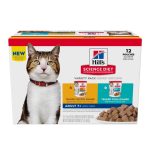Discover How To Rekindle Your Cat’s Love For Wet Food: My Cat Has Stopped Eating Wet Food – Take Action Now!
My Cat Has Stopped Eating Wet Food
Greeting, Cat Lovers! Today, we are going to discuss a common concern among cat owners – when their beloved feline companions suddenly stop eating wet food. As a cat enthusiast, it can be quite distressing to witness your cat showing disinterest in their usual meals. In this article, we will explore the possible reasons behind this behavior and provide useful tips on how to address it. Let’s delve into this matter and ensure the well-being of our furry friends.
Introduction
Our feline friends are known for their finicky eating habits, and any sudden change in their appetite can be a cause for concern. If your cat has stopped eating wet food, it’s important to understand the potential underlying reasons. By identifying the cause, you can take appropriate steps to resolve the issue and ensure your cat’s health and happiness.
1 Picture Gallery: Discover How To Rekindle Your Cat’s Love For Wet Food: My Cat Has Stopped Eating Wet Food – Take Action Now!

1. What could be the reason?

Image Source: futurecdn.net
There can be several factors contributing to your cat’s sudden aversion to wet food. It could be due to a change in their taste preferences, discomfort caused by dental issues or gastrointestinal problems, stress, or even an underlying medical condition. It’s essential to evaluate these possibilities before taking any action.
2. Who is affected?
This issue can affect cats of all ages, breeds, and sizes. Whether you have a playful kitten or a senior cat, the sudden refusal to eat wet food can be alarming. It’s crucial to monitor their behavior and eating habits closely to identify any changes.
3. When did it start?
The timing of this change in eating behavior is a crucial factor to consider. Did your cat stop eating wet food suddenly, or did it happen gradually over time? Identifying the timeline can help pinpoint the cause more accurately.
4. Where can I seek help?
If your cat’s refusal to eat wet food persists or is accompanied by other concerning symptoms, it’s advisable to consult a veterinarian. They can conduct a thorough examination, perform necessary tests, and provide appropriate guidance to address the issue effectively.
5. Why is it important to address this issue?
A cat’s diet plays a vital role in their overall health and well-being. Wet food provides essential moisture and nutrients for their bodies. Ensuring their proper nutrition is crucial to prevent potential health problems. Therefore, it is important to address this issue promptly to maintain your cat’s optimal health.
6. How can I encourage my cat to eat wet food again?
There are several strategies you can try to entice your cat to eat wet food again. Gradually introducing new flavors, warming the food to enhance its aroma, offering smaller and more frequent meals, and providing a stress-free environment during mealtimes can be helpful. Patience and persistence are key when reintroducing wet food to your cat’s diet.
Advantages and Disadvantages of Wet Food
1. Advantages:
Wet food provides superior hydration due to its high moisture content, which is beneficial for cats who may not drink enough water. It can also be easier to chew, making it suitable for kittens, senior cats, or those with dental issues. Additionally, wet food tends to have higher protein content, which supports muscle growth and maintenance.
2. Disadvantages:
On the flip side, wet food can be more expensive compared to dry food. It also has a shorter shelf life once opened, requiring proper storage to avoid spoilage. Furthermore, some cats may develop a preference for wet food, making it difficult to switch to other forms of diets if necessary.
Frequently Asked Questions (FAQs)
1. Can stress cause my cat to stop eating wet food?
Yes, stress can be a contributing factor to your cat’s change in appetite. Cats are sensitive creatures, and any change in their environment or routine can cause stress and affect their eating habits.
2. Should I be concerned if my cat refuses to eat wet food for a day?
A temporary refusal to eat wet food may not be a cause for immediate concern. However, if it persists for more than a day or is accompanied by other concerning symptoms, it is best to seek veterinary advice.
3. Can dental problems cause a cat to stop eating wet food?
Yes, dental issues such as tooth decay or gum disease can cause discomfort while chewing wet food, leading to a reluctance to eat it. Regular dental check-ups and proper oral care are essential for your cat’s overall health.
4. Are there any alternative diets for cats who refuse to eat wet food?
Yes, there are alternative diets available for cats who dislike wet food. Options include dry food, raw food, or a combination of both. However, it’s recommended to consult with a veterinarian to ensure the chosen diet meets your cat’s nutritional requirements.
5. Should I force-feed my cat if they refuse to eat wet food?
No, force-feeding is not recommended as it can cause further stress to your cat and potentially worsen their aversion to wet food. It’s best to consult with a veterinarian to determine the underlying cause and appropriate solutions.
Conclusion
In conclusion, if your cat has stopped eating wet food, it’s crucial to investigate the root cause behind this behavior. By understanding the underlying reasons, you can take the necessary steps to address the issue and ensure your cat’s health and well-being. Remember, patience, persistence, and veterinary guidance are key to successfully reintroducing wet food into your cat’s diet. Let’s prioritize our feline friends’ nutrition and keep them happy and healthy!
Disclaimer: The information provided in this article is for educational purposes only and should not replace professional veterinary advice. If you have any concerns about your cat’s health or eating habits, please consult a qualified veterinarian.
This post topic: Cats


